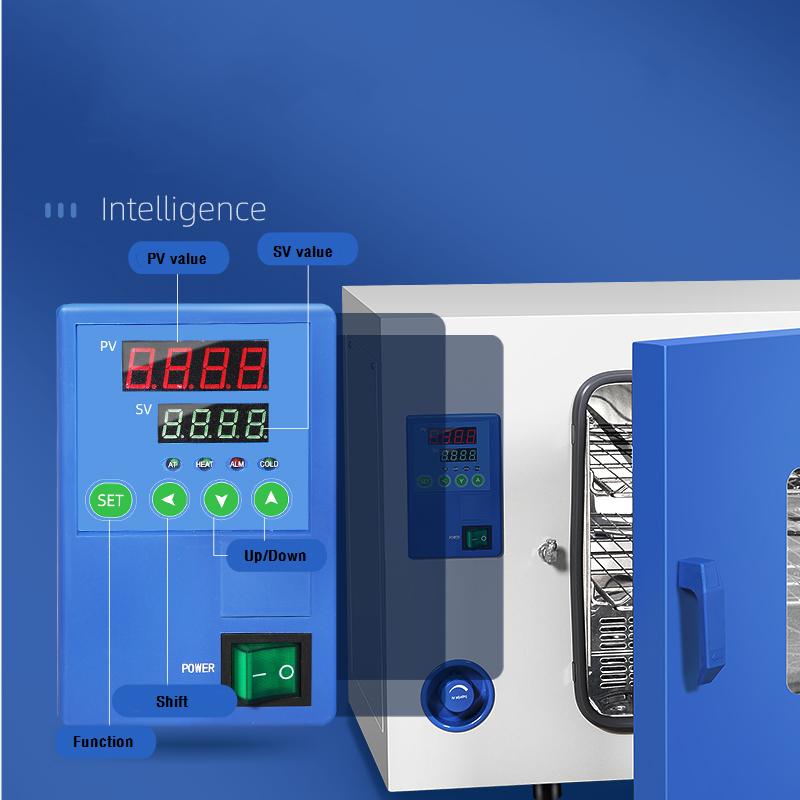
Hot air circulation drying oven is an advanced laboratory drying oven, it utilizes a centrifugal fan to force air through the chamber, and creates stronger airflow to speed up drying times, while maintaining uniform temperatures. These ovens are very energy efficient, because the air is constantly circulated and reheated, reducing the amount of energy required to maintain a constant temperature.
Model: TG-9053A
Capacity: 50L
Interior Dimension: 420*350*350 mm
Exterior dimension: 700*530*515 mm
Description
Hot air circulation drying oven uses heated airflow to bake products efficiently and uniformly. The oven typically consists of a heating element, a temperature control system, and a fan that circulates the hot air throughout the chamber. The fan helps to distribute heat evenly, ensuring products receive the same amount of heat.
Specification
|
Model |
TG-9023A |
TG-9030A |
TG-9053A |
TG-9070A |
TG-9123A |
TG-9140A |
TG-9203A |
TG-9240A |
|
Capacity |
25L |
35L |
50L |
80L |
105L |
135L |
200L |
225L |
|
Interior Dim. (W*D*H)mm |
300*300*270 |
340*325*325 |
420*350*350 |
450*400*450 |
550*350*550 |
550*450*550 |
600*550*600 |
600*500*750 |
|
Exterior Dim. (W*D*H)mm |
585*480*440 |
625*510*495 |
700*530*515 |
735*585*620 |
835*530*725 |
835*630*730 |
885*730*795 |
890*685*930 |
|
Temperature Range |
RT+10°C ~ 200°C |
|||||||
|
Temperature Fluctuation |
± 1.0°C |
|||||||
|
Temperature Resolution |
0.1°C |
|||||||
|
Temperature Uniformity |
±2.5% (test point@100°C) |
|||||||
|
Shelves |
2PCS |
|||||||
|
Timing |
0~ 9999 min |
|||||||
|
Power Supply |
AC220V 50HZ |
|||||||
|
Ambient Temperature |
+5°C~ 40°C |
|||||||
Feature
• Uniform temperature control
• Quickly heat and dry samples, able to heat samples up to 200°C
• Stainless steel sus#304 inner oven and powder-coated steel plate exterior oven, corrosion resistant
• Low energy consumption, cost saving
• PID digtal display controller brings you accurate and reliable temperature control
Structure
Hot air circulation drying oven generally consists of the following components:
• Interior Oven: Made of stainless steel SUS#304
• Insulation: Made of superfine glass wool, to minimize heat loss from the oven to the surroundings.
• Heating Element: Generates heat inside the oven.
• Circulation Fan: Circulates hot air inside the oven.
• Air Duct: The air duct is integrated with the fan, this ensures that the hot air flows through the oven continuously.
• Temperature Sensor: Measures the temperature within the oven.
• Control System: Regulates the temperature and timing of the drying process.
In operation, the heating element heats up the air, the air is then circulated by the fan through the air duct into the oven chamber, and finally out through the exhaust. This whole process ensures uniform heating and drying of the materials.
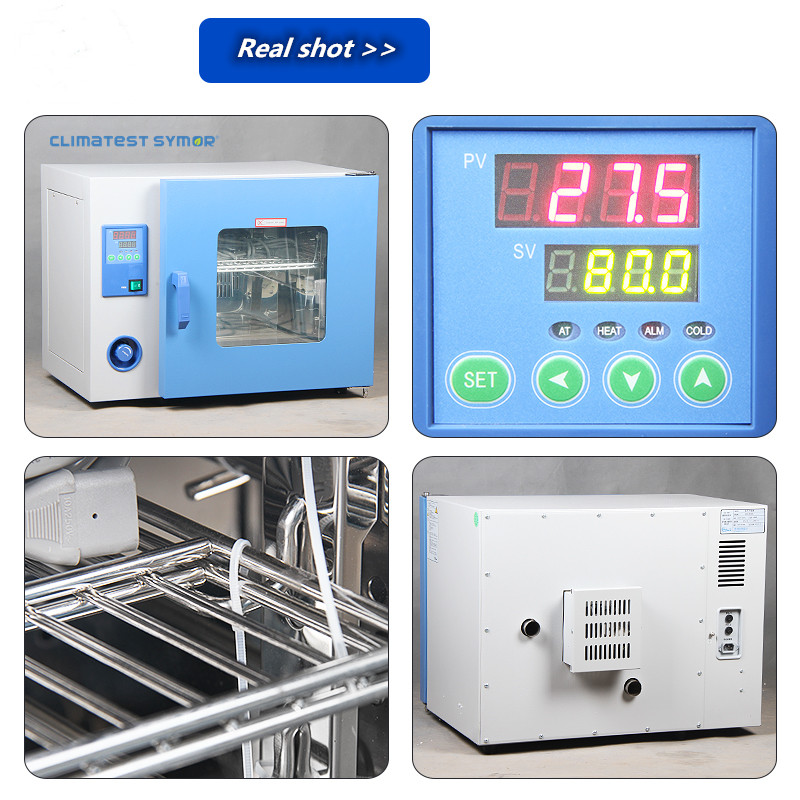
Application
Hot air circulation drying oven is commonly used in electronics manufacturing industry, to remove moisture from electronic components and restore their shelf life.
Here are a few examples of how drying ovens are applied in electronic manufacturing:
Surface Mount Technology (SMT): During the SMT process, electronic components are mounted on PCB (printed circuit boards) using a pick-and-place machine. After the components are placed, the boards go through a reflow oven where the solder paste is melted to connect the components to the board. Since the components and boards may absorb moisture during the process, a drying oven is used to remove any excess moisture and prevent potential failure due to moisture penetration.
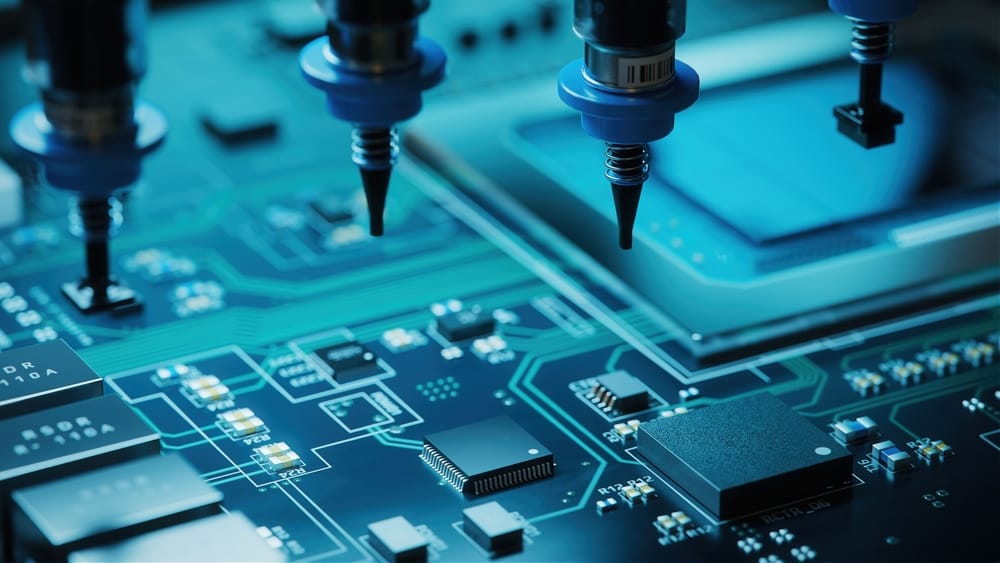
Wave Soldering: Wave soldering involves passing the bottom of the PCB over a pool of molten solder, which creates a solid joint between the PCB and electronic components. Before wave soldering, the PCB is washed with water-soluble flux to remove any oxidation from the board. The PCB is then passed through a drying oven to remove any remaining moisture before wave soldering so that the oxidation does not turn into contaminants during the soldering process.
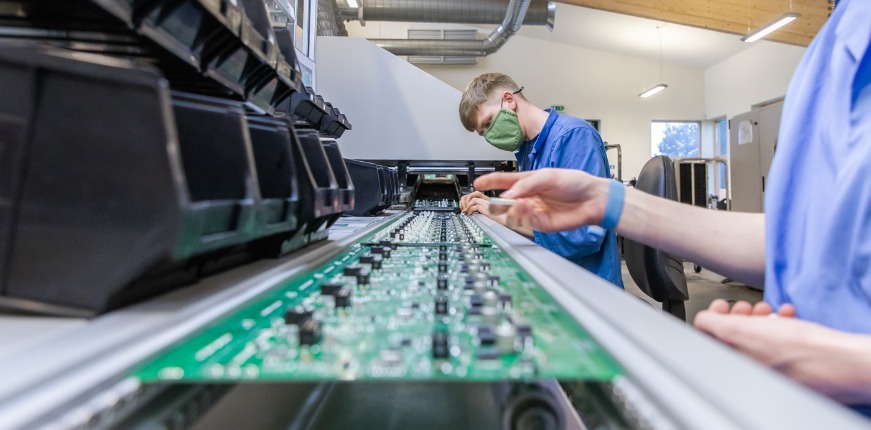
Potting and Encapsulation: To protect electronic devices from moisture, it's common practice to coat the device with a potting or encapsulation material that is waterproof. These materials usually contain a curing process that requires high temperature baking to ensure the complete curing of the material. This involves placing the device in the drying oven to cure the potting or encapsulation material.
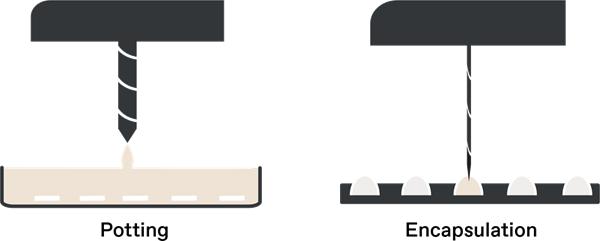
Solder Paste Application: Solder paste is commonly used to attach electronic components to PCB before reflow soldering. The paste is made of metal particles and flux which are mixed into a paste form. Since the solder paste absorbs moisture, it is critical to dry the paste before use. Baking ovens are used to remove any moisture from the solder paste to ensure it adheres correctly and doesn't cause weak solder joints.
Hot air circulation drying ovens are essential in modern electronics manufacturing. These ovens help to avoid potential electronic failure by removing moisture from various stages of the manufacturing process.
Baking electronic components in a drying oven
Hot air circulation drying oven works through heating to remove moisture from the electronic parts. The oven provides a controlled temperature environment, this is settable as required. The oven operates at various temperature ranges from 50°C to 150°C.
The baking process takes several hours, and during this time, the electronic components are exposed to the controlled environment. This allows the moisture absorbed by the components to evaporate, but still don’t damage the components.
After the baking process is complete, the electronic parts should cool slowly to avoid thermal shock. The baked components are then sealed in moisture-free packaging to prevent moisture absorption again.
Overall, hot air circulation drying oven is an optimal choice to restore the floor life of your electronic components, and greatly improve your production efficiency.
